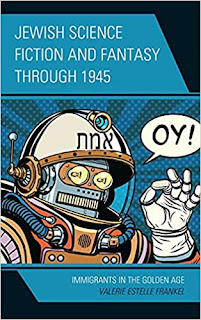Jewish Science Fiction and
Fantasy Through 1945: Immigrants in the Golden Age by Valerie Estelle
Frankel (Lexington Books, 2021)
Reviewed by Rabbi Reuven Chaim Klein
This book presents an interesting
kaleidoscope of Jewish contributions to the genres of science fiction and
fantasy, starting with the late nineteenth century through the end of World War
II. It is presented like an academic study, but is actually quite readable for
a lay audience as well. Alongside the more obvious names like Franz Kafka,
Isaac Asimov, and Shalom Aleichem are some less apparent authors who
contributed to this field, like Theodore Herzl and Jerry Seigel. The book cites
many earlier scholars who researched this topic and brings together all sorts
of thought-provoking insights as to how Jew contributed to the literary fields
of science fiction/fantasy in various artistic media (including short stories,
books, comics, graphic novels, silent films, and talkies).
The first few chapters of this
book focus on providing the reader with synopses of various short stories and other
collections written by Jews that represent the experimental stage of the genres
in question, i.e., before they had become mainstream reading. Part of these
chapters focus on the so-called Futurists who wrote fantastical stories about a
time unlike their own. As the author makes clear, these Jewish writers were
clearly influenced by earlier secondary Jewish literature/beliefs that included
stories about such things as the Dyybuk, the Golem, and assorted
tales about King Solomon.
Later chapters explore how Jews’
writing in fantasy related to Nazism, Zionism, humor, and the like. In the
lead-up to World War II and during the dark years of the Holocaust, some Jewish
writers and those who sympathized with the Jewish plight used harnessed the
power of fantasy and science fiction to produce anti-Nazi propaganda and affect
public opinion.
This book also discusses famous
Jews in the early movie industry including the Three Stooges, the Marx
Brothers, and Charlie Chaplin (who was not Jewish himself, but certainly
commiserated with the Jews), as well as the individuals involved in comic book
industry in its earliest years.
Various literary motifs that this
book shows were heavily influenced and established by Jewish writers include
time travel, alternate histories, utopia/dystopia, and—of course comedy.
Another important Jewish theme
that the author shows is omnipresent in the works of early fantasy and science
fiction is the notion of assimilation versus tradition. Many Jews involved in
writing or producing works of fantasy immigrated to America from the Old
Country, and in some ways were eager to shed their Old-World identities and
adopt new ones. Yet, on the other hand, they were often proud to be Jewish and
wanted to express their Jewishness in some way. In practice, many of these
immigrants changed their names to give off the appearance of being more
American, but still used Jewish themes and ideas in their actual works. Indeed,
this tension also often led to the covert expressions of Jewish ideals and
concepts in the works of early fantasy writers, without the need to explicitly
label characters in their works as Jewish.
Case in point: Superman
represents the quintessential superhero of this genre, and like many Jews in
America at the time, he too came from a faraway, strange land, but adopted a
thoroughly American identity in the form of Clark Kent to blend in with his newfound
home. Of course, Superman was the creation of Jewish fantasy writers, and his
aboriginal Kryptonian name Kal-El even has a Semitic ring to it. In fact, this
book cites a witty observation from another scholar who noted that anyone whose
name ends in “-man” is either Jewish (e.g., Grossman, Goldman, Lieberman) or a
superhero (e.g., Superman, Batman, Spiderman).
In final analysis, this reviewer
feels that the book was a fun read. It was generally easy to follow the
author’s arguments and, all in all, was an easy read. Although in this
reviewer’s opinion the book could have benefitted from more editing, Ms.
Frankel’s author biography boasts an impressive “over eighty books on pop
culture.” Besides the sources she cited in the body text of the book, the author
also provides the reader with a comprehensive bibliography that contain many
more related sources, should the reader choose to pursue further examining the
topic. Indeed, once the reader whets his appetite with Ms. Frankel’s book, he
or she might want to learn more about the Jews’ place in forming the modern
genres of fantasy and science fiction.
